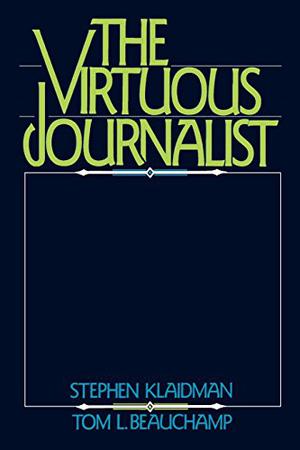by Stephen & Tom L. Beauchamp Klaidman ‧ RELEASE DATE: March 1, 1987
An evenhanded and engrossing inquiry into the many moral problems that can arise in reporting and editing the news (see also David Broder, p. 272). Klaidman (a sometime newsman) and Beauchamp (philosophy/Georgetown) conclude there are indeed objective standards that are essential to the ethical and equitable practice of journalism. Their requisite virtues (which take professional competence for granted) include impartiality (insofar as humanly possible), truthfulness (of which unbiased accuracy is but one aspect), responsibility (e.g., the conscious avoidance of gratuitous harm), willingness to accept the obligation of providing the public with reliable information on matters of vital interest (personal health, political developments, taxation, et al.), trustworthiness (a capacity that extends to the wit to escape manipulation), and accountability. In advancing these and allied guidelines, the authors indulge in a minimum of ivory-tower theorizing. To make important points, they cite case studies ranging from Baby Doe through the CBS-Westmoreland case, Time vs. Ariel Sharon, Janet Cooke's fraudulent Pulitzer, the Hitler diaries hoax, belated disclosure of Jesse Jackson's anti-Semitism, and the dearth of network coverage of South Africa that followed Pretoria's imposition of restrictions on TV crews. Fully aware that media enterprises are in business to turn a profit, Klaidman and Beauchamp also understand the realities of competing claims (e.g., a reporter's inability to pursue a story owing to limited organizational resources) and conflicting interests (advertising vs. editorial). They also understand that at best journalism is history in a hurry. Commercial considerations and deadline pressures notwithstanding, the authors are convinced that correspondents and their superiors can do a far better job than they have of publishing or broadcasting the news. Staunch advocates of press freedom (but not license), the authors suggest that an excellent way for media people to start regaining some of the trust lost through sins of omission and commission would be to invite examination and obligate themselves to respond forthrightly to responsible criticism. Taking the world as they find it, Klaidman and Beauchamp make no systematic effort to assign blame for press lapses--or credit for achievements, for that matter. Their sage diagnosis of and prescriptions for what ails the fourth estate make for a compelling text that deserves a readership beyond news rooms and TV studios.
Pub Date: March 1, 1987
ISBN: 0195056884
Page Count: -
Publisher: Oxford Univ. Press
Review Posted Online: N/A
Kirkus Reviews Issue: Feb. 15, 1987
Categories: NONFICTION
© Copyright 2024 Kirkus Media LLC. All Rights Reserved.
Hey there, book lover.
We’re glad you found a book that interests you!
We can’t wait for you to join Kirkus!
It’s free and takes less than 10 seconds!
Already have an account? Log in.
OR
Trouble signing in? Retrieve credentials.
Welcome Back!
OR
Trouble signing in? Retrieve credentials.
Don’t fret. We’ll find you.

